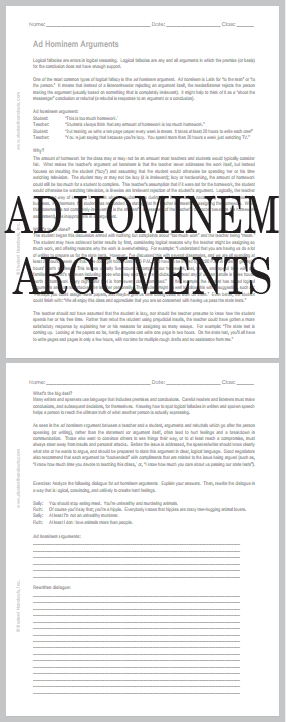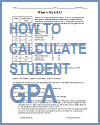| Ad hominem Arguments Worksheet |
|---|
| www.studenthandouts.com ↣ Social Studies ↣ Debate and Logic |
Logical fallacies are errors in logical reasoning. Logical fallacies are any and all arguments in which the premise (or basis) for the conclusion does not have enough support. One of the most common types of logical fallacy is the ad hominem argument. Ad hominem is Latin for "to the man" or "to the person." It means that instead of a listener/reader rejecting an argument itself, the reader/listener rejects the person making the argument (usually based on something that is completely irrelevant). It might help to think of it as a "shoot the messenger" conclusion or rebuttal (a rebuttal is response to an argument or a conclusion). Ad hominem argument: Ad hominem argument:Student: "This is too much homework." Teacher: "Students always think that any amount of homework is too much homework." Student: "But making us write a ten-page paper every week is mean. It takes at least 20 hours to write each one!" Teacher: "You're just saying that because you're lazy. You spend more than 20 hours a week just watching TV." Why? The amount of homework for the class may or may not be an amount most teachers and students would typically consider fair. What makes the teacher's argument ad hominem is that the teacher never addresses the work itself, but instead focuses on insulting the student ("lazy") and assuming that the student would otherwise be spending her or his time watching television. The student may or may not be lazy (it is irrelevant); lazy or hardworking, the amount of homework could still be too much for a student to complete. The teacher's assumption that if it were not for the homework, the student would otherwise be watching television, is likewise an irrelevant rejection of the student's argument. Logically, the teacher can have no way of knowing for certain what a student does during free time, nor is it necessarily any of the teacher's business. Furthermore, the student has responded by stating that the teacher is "mean" for assigning the homework. While this statement is not completely irrelevant (it is the student's assessment of the teacher's character based on the homework assignment), it is inappropriate in an argument. What's to be done? The student began this discussion armed with nothing but complaints about "too much work" and the teacher being "mean." The student may have achieved better results by first, considering logical reasons why the teacher might be assigning so much work, and offering reasons why the work is overwhelming. For example: "I understand that you are having us do a lot of writing to prepare us for the state tests. However, I've discussed this with several classmates, and we are all spending at least 20 hours a week on this. We don't get home until 5:00 P.M., and have to be in bed by 10:00 P.M. in order to get eight hours' worth of sleep. This leaves us only five hours to complete our homework, eat, bathe, and spend time with our families; and that's not even including those who play sports or are in clubs. The most any of us can handle is three hours' worth of homework every night, and that is from every class combined." In this example, the student has raised logical arguments and has not attacked the teacher personally. The student might do well to follow this with a suggestion, such as: "Perhaps you could assign fewer papers, and maybe give us time during class to work on them." Even better, the student could finish with: "We all enjoy this class and appreciate that you are so concerned with having us pass the state tests." The teacher should not have assumed that the student is lazy, nor should the teacher presume to know how the student spends her or his free time. Rather than rebut the student using prejudicial insults, the teacher could have gotten a more satisfactory response by explaining her or his reasons for assigning so many essays. For example: "The state test is coming up. Looking at the papers so far, hardly anyone can write one page in two hours. On the state test, you'll all have to write pages and pages in only a few hours, with no time for multiple rough drafts and no assistance from me." What's the big deal? Many writers and speakers use language that includes premises and conclusions. Careful readers and listeners must make conclusions, and subsequent decisions, for themselves. Knowing how to spot logical fallacies in written and spoken speech helps a person to reach the ultimate truth of what another person is actually expressing. As seen in the ad hominem argument between a teacher and a student, arguments and rebuttals which go after the person speaking (or writing), rather than the statement or argument itself, often lead to hurt feelings and a breakdown in communication. Those who want to convince others to see things their way, or to at least reach a compromise, must always steer away from insults and personal attacks. Before the issue is addressed, the speaker/writer should know clearly what she or he wants to argue, and should be prepared to state this argument in clear, logical language. Good negotiators also recommend that each argument be "bookended" with compliments that are related to the issue being argued (such as, "I know how much time you devote to teaching this class," or, "I know how much you care about us passing our state tests"). Exercise: Analyze the following dialogue for ad hominem arguments. Explain your answers. Then, rewrite the dialogue in a way that is logical, convincing, and unlikely to create hard feelings. Sally: You should stop eating meat. You're unhealthy and murdering animals. Ruth: Of course you'd say that; you're a hippie. Everybody knows that hippies are crazy tree-hugging animal lovers. Sally: At least I'm not an unhealthy murderer. Ruth: At least I don't love animals more than people. Click here to print (answers will vary). |
 |  |  |  |  |  |
| www.studenthandouts.com ↣ Social Studies ↣ Debate and Logic |














































